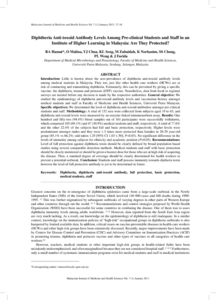Citation
Awang Hamat, Rukman and Osman, Malina and Chua, Y. J. and Seng, K. L. and M., Zubaidah and K., Norhanim and Chong, Seng Shueh and Weng, Poh Leng and Jamal, Farida Fatema@Farida
(2011)
Diphtheria anti-toxoid antibody levels among pre-clinical students and staff in an institute of higher learning in Malaysia: are they protected?
Malaysian Journal of Medicine and Health Sciences, 7 (1).
pp. 27-34.
ISSN 1675-8544
Abstract
Introduction: Little is known about the sero-prevalence of diphtheria anti-toxoid antibody levels among medical students in Malaysia. They too, just like other health care workers (HCWs) are at risk of contracting and transmitting diphtheria. Fortunately, this can be prevented by giving a specific vaccine: the diphtheria, tetanus and pertussis (DTP) vaccine. Nonetheless, data from local or regional
surveys are needed before any decision is made by the respective authorities. General objective: We studied the epidemiology of diphtheria anti-toxoid antibody levels and vaccination history amongst medical students and staff in Faculty of Medicine and Health Sciences, Universiti Putra Malaysia. Specific objectives: We determined the level of diphtheria anti-toxoid antibodies amongst pre-clinical
students and staff. Methodology: A total of 152 sera were collected from subjects aged 19 to 63, and diphtheria anti-toxoid levels were measured by an enzyme-linked immunosorbent assay. Results: One hundred and fifty-two (94.4%) blood samples out of 161 participants were successfully withdrawn, which comprised 105 (69.1%) and 47 (30.9%) medical students and staff, respectively. A total of 77.6% and the other 22.4% of the subjects had full and basic protection, respectively. Higher levels were predominant amongst males and they were 1.3 times more protected than females in 20-29 year-old group (85.1% vs 66.2%; odd ratios 1.25 [95% CI 1.03-1.50]; P=0.03). No significant difference in the levels of immunity among subjects for ethnicity and academic position (P>0.05). Recommendations: Level of full protection against diphtheria toxin should be clearly defined by broad population based studies using several comparable detection methods. Medical students and staff with basic protection
should be closely monitored or should be given a booster dose for those who are at high risk of acquiring
the disease. Thus, a standard degree of coverage should be clearly determined for health workers to prevent a potential outbreak. Conclusion: Students and staff possess immunity towards diptheria toxin however the level of full protective antibody is yet to be determined in future.
Download File
![[img]](http://psasir.upm.edu.my/24588/1.hassmallThumbnailVersion/Diphtheria%20Anti-toxoid%20Antibody%20Levels%20Among%20Pre-clinical%20Students%20and%20Staff%20in%20an.pdf)  Preview |
|
PDF
Diphtheria Anti-toxoid Antibody Levels Among Pre-clinical Students and Staff in an.pdf
Download (169kB)
| Preview
|
|
Additional Metadata
Actions (login required)
 |
View Item |

